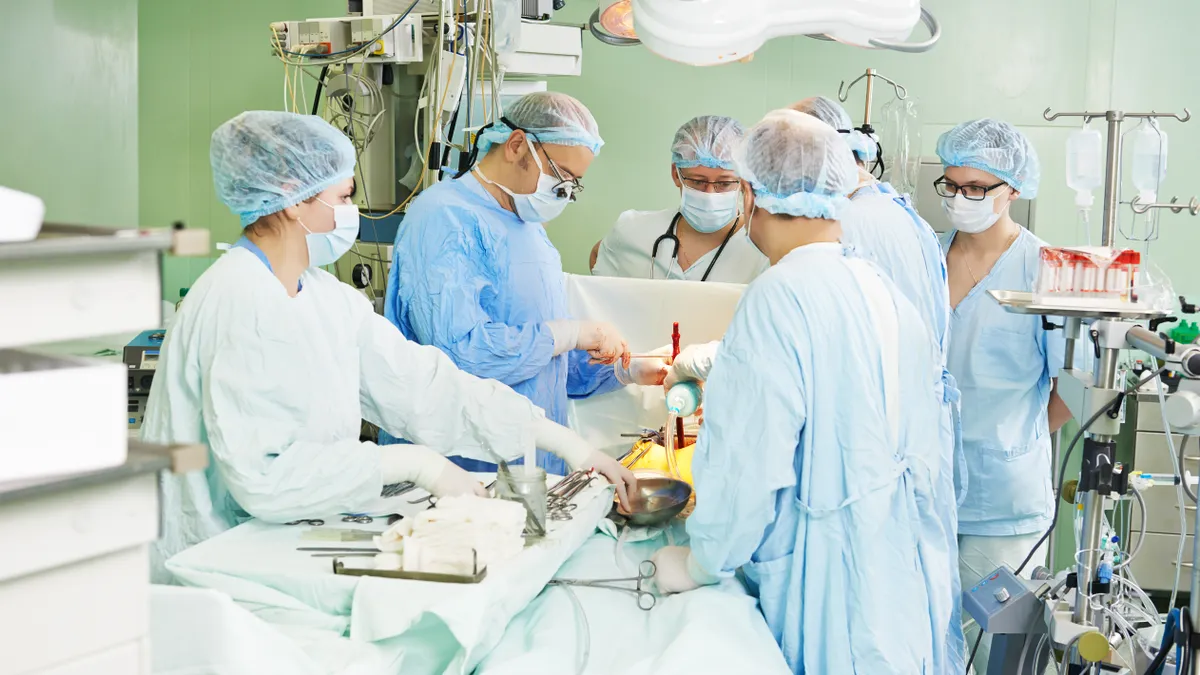The flight of joint replacements and other lucrative procedures from acute care hospitals to ambulatory surgery centers was happening before the COVID-19 pandemic, but the crisis may prove to accelerate the trend.
“That shift was underway, but not very quickly: things never are in healthcare,” said Tim van Biesen, head of Bain & Company’s global healthcare practice.
Some 5,700 ASCs in the U.S. carried out 23 million procedures in 2018, according to data cited by Bain last fall. The year prior, ASCs reportedly carried out more than half of all outpatient surgeries, versus having 32% share 15 years ago.
The specialized, lower-cost centers have been an apple of private equity’s eye, and have allowed more business to be taken away from acute care hospitals in recent years as CMS has moved additional procedures off of its inpatient-only list.
In the context of COVID-19, with many ASCs able to work through elective procedures sooner or at greater capacity than their hospital counterparts, the centers are all the more critical to the financial recovery of many medtechs and health systems alike.
That shift isn't just jarring to some hospitals' revenue mix. Broadly speaking, the different cost structure at ASCs means they can offer surgical procedures at 35% to 50% less than hospital rates, according to Bain. This reality may require medtech companies to adjust their traditional commercial model.
That same report pegged volume of procedures at ASCs to grow by 6% to 7% a year through 2021, with orthopaedic, spine and cardio procedures estimated to accelerate most rapidly through the mid-2020s.
As U.S. states go through phased reopening, many outpatient care settings like ASCs are primed to begin chipping away at the backlogs of elective procedures sooner than hospitals, which in some areas are still prioritizing COVID-19 care and safety measures. A Jefferies survey of 40 orthopaedic surgeons earlier this month found 12% of procedures were currently being done in ASCs, a figure expected to reach 20% in six months.
For device makers with significant knee businesses like Stryker and Zimmer Biomet, it was a big deal when CMS removed total knee arthroplasty from the Medicare inpatient-only list in 2018. Bain now expects the share of knee replacements in ASCs to rise from roughly 10% to close to 30% by the mid-2020s.
Stryker, which reported a 65% drop in orthopaedic and spine sales during April and classified half of its business as vulnerable to deferrals, is among those eager for elective procedures to resume.
“The trend to ASCs will only accelerate,” CEO Kevin Lobo said on its first quarter earnings call, with the caveat there’s still “a long way to go,” but, “that pace will increase.”
Zimmer CEO Bryan Hanson made comments on its Q1 call weeks later not necessarily affirming the trend will accelerate, but saying, "I would expect, generally speaking, that momentum towards ASC to continue."
A new tailwind for the trend: patients' desire to feel safer when seeking care in a mid-pandemic world.
“One of the easiest ways of coaxing patients back to get a procedure done is to do it outside the hospital, to have a much more controlled environment, to have a purpose-built facility: which of course ASCs provide. So I think there's a patient push that simply didn't exist before," said Brian Chapman, who leads the medtech practice at consultancy ZS Associates.
A key limiting factor may simply be existing ASC capacity, noted Katherine Owen, Stryker’s outgoing vice president of strategy and investor relations, during the company's Q1 call.
That constraint could lead to construction of new ASCs, increases in staffing, and further acquisition of the centers by health systems.
And the medtech impact of the shift in procedures extends beyond orthopaedic or cardiac device companies. ASCs have been a key talking point for sleep apnea technology maker Inspire Medical, for example, which compared to incumbent medtechs has only been doing business for a little over a decade. Inspire is looking to contract with more ASCs.
The range of products and volume of procedures is comparatively smaller for a growing company like Inspire, said Ravi Misra, an analyst at Berenberg Capital Markets.
"For them, it's all about the land grab ... They want to basically create the opportunity for a patient to have this procedure as many places as possible," he said. "They're early enough where they can kind of navigate through these waters without meaningful risk."
It's unclear just how long ASCs' advantage will last before acute care hospitals seek to meaningfully reclaim certain procedure volumes, but Bain's van Biesen is among those who predict COVID-19 will ultimately serve as a net win for ASCs' business volumes.
"[Hospitals] will see some moderation or re-equilibration, but again, not back to where we were before COVID," he said. "It is likely then that having created a volume of procedures that both surgeons and patients are comfortable with in ambulatory surgery centers, [it] will continue. It will amount to an acceleration of this pre-existing trend."












